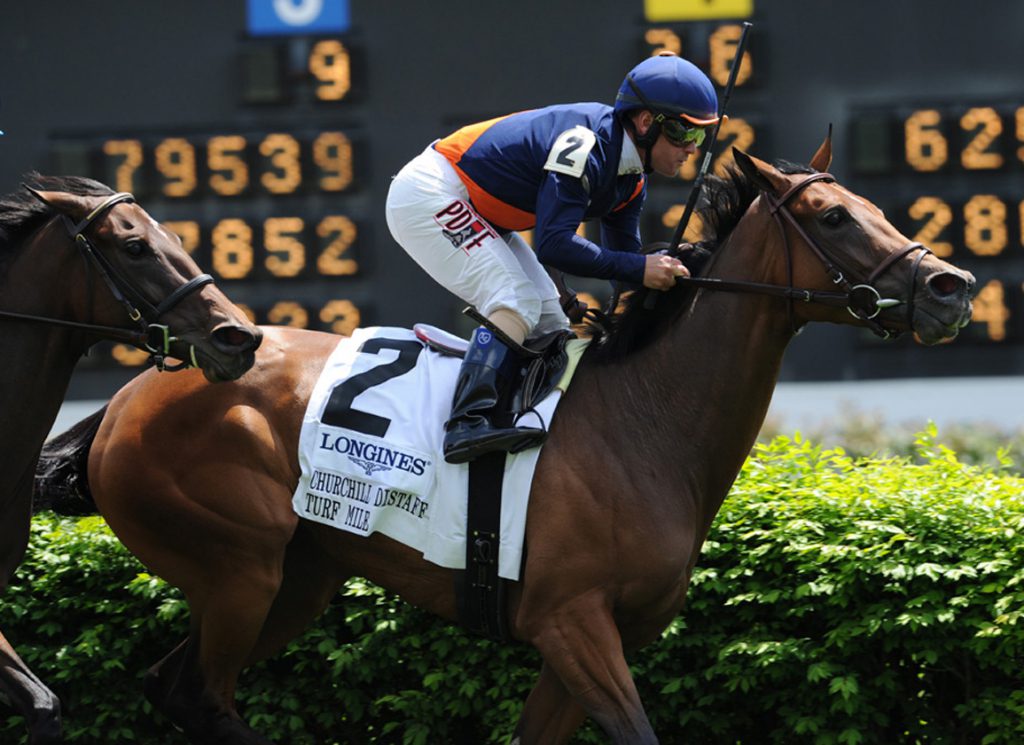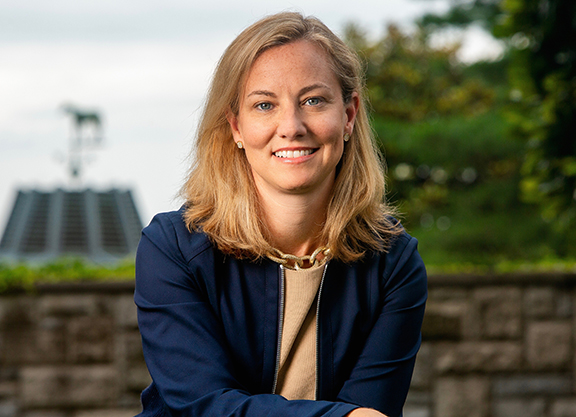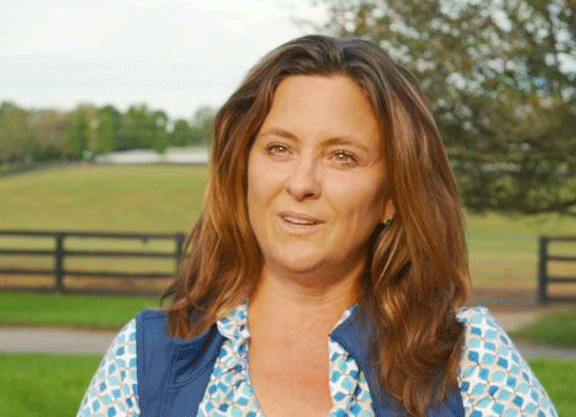Most of us, in this business, have experienced times when we would implore Jerry Amerman to leave that flier, promoting a horseracing syndicate, right where her husband John had thrown it–in the wastebasket. Happily, while they have sampled the full spectrum of the Turf's ups and downs in the 35 years since, their sense of fulfilment only continues to grow.
And the sport has itself welcomed corresponding gains from their presence: John's judgement, seasoned by a stellar business career, has been drafted by numerous regulatory and benevolent bodies; Jerry's love of animals, besides prompting service of her own, has forged a special place in the community of horsemen; and now, in an unexpected sequel, they find themselves creating a living legacy in a young stallion with the potential to seize an important moment in the evolution of American grass racing.
But first let's go back to that wastebasket. It wasn't their first mailshot from Barry Irwin at Clover Racing and John, wearily going through the post after another long day at work, had promptly disposed of this postcard the same way.
“More junk mail,” he said.
“Wait a minute,” said Jerry, fishing it out again. “It says: 'You too can own a Thoroughbred racehorse.' Isn't that what we're always talking about doing?”
Well, yes it was. So they dipped their toes. A couple of their early experiments never got anywhere, and the first to do so had to be retired after winning her graded stakes debut. But they were impressed with the way the syndicate was run and stayed aboard as it evolved into Team Valor–where they would enjoy an especially thrilling ride with that tireless globetrotter Star of Cozzene (Cozzene).
“You know, the camaraderie with the other people in the syndicate was great,” John reflects. “But most importantly, we learned a lot. If you're just getting into horseracing, a syndicate is a great way to start; a great learning exp
erience.”
By the time Star of Cozzene was sold to Japan, John was approaching the end of a spectacular stint as CEO of Mattel. When he took the helm in 1987, Barbie and her friends were in big trouble: the company had just soaked up a loss of $113 million. As early as 1990, John had turned things round for a record $91-million profit. In between, unsurprisingly to those in our industry who have since come to appreciate his affability and teamwork, he had prioritized morale at workshop level. He became a familiar daily presence around headquarters: eating in the cafeteria, encouraging questions, expanding horizons.
John stood down as CEO in 1997, having radically expanded international trade, and in the preceding couple of years he and Jerry had resolved to branch out into their own racing stable. Asked whether he adapted any lessons from his Mattel experience to this new enterprise, John doesn't hesitate.
“Good people,” he says. “If I think back to my days at Mattel, we had terrific people. And horseracing is a complicated sport. It's very spread out. You really have to rely on others, to find the right mix. If you have good people working on your behalf, it makes things a lot simpler. If you're trying to do these things without knowing who the good people are, and knowing their backgrounds, then it just becomes so much harder for the horse. And all the way through we've been very blessed by having excellent support people.”
Take, for instance, bloodstock agent Bob Feld. They had observed his expertise with the syndicates, and he was duly enlisted to help lay foundations for their stable. One inspired early find was GI Hollywood Futurity winner Siphonic (Siphon {Brz}), whose loss to a heart attack was a harrowing moment for the Amermans. But there was a happier sequel for another Grade I winner acquired by Feld as a yearling, Balance (Thunder Gulch), whose A.P. Indy colt made $4.2 million as a yearling after her half-sister proved to be none other than Zenyatta (Street Cry {Ire}).
“I still think Siphonic was probably the best we ever had,” Jerry says. “What happened to him was one of the most painful things that we have experienced. But Bob has been invaluable. We've been buying horses together a long time, since the very beginning, really. Frankly, I tend to look at the whole horse and, if the whole picture looks good to me, I'll say 'yea'. But Bob will say, 'No, wait, there's a little problem here.'”
Jerry's own eye for a horse, and curiosity as a breeder, was first stimulated by German Shepherds.
“At times I've had as many as four of those dogs in my house!” she says. “And several have been champions. And I tell you, it's been a great help watching horses. Because if you know Shepherds, movement is the big thing: their trot is incredible. And I've found that sharpens your eye for looking at how horses move, too.”
That was evidently one key to Jerry's warm relationship with an equally passionate dog owner, in his case Australian Shepherds. Because the surest way for any human being to get on the same wavelength as the late Bobby Frankel was to share his devotion to animals.
“I think Bobby liked us not because of me, but because of Jerry!” says John with a chuckle. “She just loves horses, so did he, and they just got along so well. Bobby took us to great heights. I think we've had close to 30 Grade I wins and Bobby was involved with so many of them. Just an amazing horseman. I remember one time on the backstretch Bobby was talking to me and, without even turning his head, just out of the side of his eye, he was able to call out to his assistant, 'Hey, Humberto, that horse is off in the back!'”
John will always remember Frankel calling to ask: “Would you like to buy a Grade I horse?”
“Well, sure.”
“There's only one catch. She's in Australia.”
“Well,” John said. “I guess we've got planes now.”
And that turned out to be their first elite runner: triple Grade I winner Happyanunoit (NZ) (Yachtie {Aus}). But the introduction for which the Amermans will always be most grateful was to Mill Ridge: initially to the late Alice Chandler and subsequently to her esteemed son and grandson, Headley and Price Bell. This was in 1998, still early days for their stable, and began with a partnership in a Gone West colt that had lacked commercial size.
“Bobby said, 'You need to go and talk to Alice Chandler,'” Jerry recalls. “Of course we knew about her, we'd bought yearlings from Mill Ridge, so we went and introduced ourselves. And it turned out she had this yearling, as she said: 'I just can't throw him to the wolves at the sale.' I said, 'Of course you can't.'
“So we went halves on that colt, who didn't do anything but bring us together. Which was so wonderful for us, because there was nobody like Alice. She should be everybody's hero. I admired her tremendously. And now I feel I have family in Kentucky: Alice was a terrible loss but Headley and Price are terrific, and it's so nice that Oscar can stand at the same farm where he was born.”
Ah yes: Oscar! Their premier racetrack earner, with nearly $2.5 million, Oscar Performance was homebred from Devine Actress (Theatrical {Ire}), who had been acquired after winning a maiden for another owner in the Dave Hofmans barn.

Oscar Performance (blaze) heads for home in the Woodbine Mile | Michael Burns
Headley and Price have now launched him as a stallion at a critical moment for turf breeding in the Bluegrass, following the loss of his own sire Kitten's Joy and also English Channel. Their farm long had international influence as home to Gone West and Diesis (GB), and the way Oscar Performance has started–with four graded-stakes performers already, from 11 first-crop winners to date–is highly auspicious, given how he continued to thrive after winning at the Breeders' Cup as a juvenile.
“Oscar has been pretty precocious, with winners spread all over the place,” John remarks. “But we were very proud, when he was running, that he could win Grade Is at two, three and four. Though from my perspective the best race he ever ran was the [GIII] Poker, where he tied the world record for a mile in 1:31.23. He just blew them away. He was a tremendous horse, and now he's proving it as a stallion as well.
“Full credit to Mill Ridge. They hadn't had a stallion for a few years so we're just very pleased with what has happened. He's really prospered and it's been such fun, this late summer and fall, watching all the Oscar babies run. I don't think we ever thought having a stallion could be this exciting, but it's terrific. It's almost like they're your own, when you're watching them. And we're looking forward to the Breeders' Cup because, knock wood, we think he's going to have quite a few in the turf races.”
Needless to say, the Amermans have supported the horse with their own mares, where compatible. Developing their own families has been one of the joys of their program, and the stock nowadays grazing Mill Ridge include fourth generation foals tracing to Society Dream (Fr) (Arakad {Fr}), imported by Neil Drysdale to win them a stake in California. Her daughter Miss Chapin (Royal Academy) was a sparkling winner on her only start for Frankel and, though now 21, has delivered consecutive sons for Oscar Performance. Previously Miss Chapin had produced millionaire Coffee Clique (Medaglia d'Oro), winner of the GI Just a Game S.; while another daughter, graded stakes-placed Royal Fury (Langfuhr), now has her first foal up and running in Furiously, a son of Oscar Performance who recently broke his maiden for Graham Motion.
Coffee Clique was actually culled at the Keeneland November Sale last year, in one of those disciplined decisions required of every elite program. The Amermans try to keep the broodmare band to around 15, and everyone knows that sales are essential to each new cycle–as, for instance, when shock GI Breeders' Cup Distaff winner Adoration (Honor Grades) was cashed in to Demi O'Byrne for $3.1 million at the equivalent auction in 2007.
This time round their star offering is imported GII Edgewood S. winner Gift List (GB) (Bated Breath {GB}).
“We're always interested in mares and fillies from Europe, as we feel there are good opportunities for racing and a residual value, too,” John explains. “And it has turned out that way with Gift List. We looked at her races in Britain and I thought she showed a tremendous kick. So we brought her over and she ran second in the [GII] Appalachian S. and then won the Grade II at Churchill by four and a half. We were on top of the world, to see her do that against horses like Aunt Pearl (Ire) (Lope de Vega {Ire}). Unfortunately she then got a chip, and didn't really return as well as we thought she might, but she's obviously very talented.”
“It's pretty hard to let any mare go, when you have a stallion like Oscar,” admits Jerry. “But I do know that sometimes you have to.”
After many decades of practice, the Amermans have learned to trust each other's judgement: inevitably there are times when one spouse has to proceed with a purchase even when the other is not available to sign it off. But that's where the reliable caliber of their counsel is so crucial: whether Headley and Price Bell, or Bob Feld, or trainers like Brian Lynch, who handled Oscar Performance so well; or their valued pre-trainer in Ocala, Barry Berkelhammer.
And, with a profound sense of gratitude for their Turf adventure, both Amermans have reciprocated with their own experience and judgement. John has been on many boards, including as a steward of The Jockey Club, and especially enjoyed seven years with the American Graded Stakes Committee; while Jerry served on the University of Kentucky Gluck Equine Research Foundation. And then there's Peacefield Farm, their aptly named rehab sanctuary at Temecula, California, for racetrack warriors that require patching up.
“The last few years we had Beholder (Henny Hughes) here, and Ce Ce (Elusive Quality), and United (Giant's Causeway),” John says. “Many good horses that have been banged up a little bit have come here before going back to the track and excelling, so we're proud of that.”
It tells you everything that the race John singles out as his highlight, with Oscar Performance, was one he couldn't even bring himself to watch.
“I stood behind him,” Jerry remembers with a laugh. “And had to tell him what was happening.”
“But that's it, you get so involved,” John replies. “It's such an incredible sport. The lows are not fun, but the highs are so high. We got involved when I was just about to retire: after working for many years, I thought, 'Well, now I'm going to sit back and rest.' I soon discovered that running a business had been easy. It was horseracing that was really difficult. But it's been a very gratifying experience, and a very rewarding one. We just feel blessed. I'm so pleased that Jerry took that card back out of the wastebasket.”
The post Amermans Credit Performance to Best Supporting Actors appeared first on TDN | Thoroughbred Daily News | Horse Racing News, Results and Video | Thoroughbred Breeding and Auctions.








